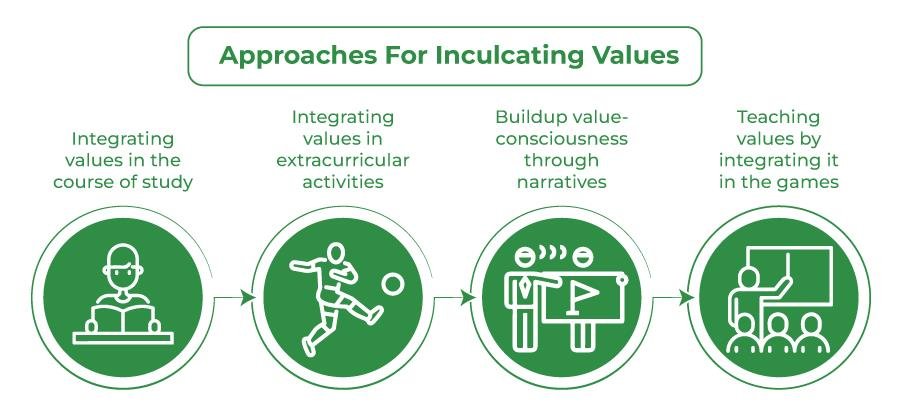Value Education
The prime concern of education is holistic development, encompassing intellectual, moral, and social growth. It aims to impart knowledge, critical thinking, and ethical values, preparing individuals for responsible citizenship. Education fosters skills, creativity, and adaptability, ensuring personal empowerment and societal progress while promoting equality, innovation, and lifelong learning.
| “Education which doesn’t mould character is wholly worthless”- Mahatma Gandhi.
“Intelligence plus character that is the true goal of education.”– Martin Luther King Kothari Commission has rightly mentioned that the “Destiny of a nation is being shaped in her classroom”. What we learn in the classroom should be reflected in our behaviour in society. |
Role of Educational Institutions in Inculcating Values
Educational institutions play a pivotal role in the inculcation of values among students, shaping not only their academic knowledge but also their character, ethics, and understanding of societal norms.
The society is one of the main stakeholders in our education. The welfare of humanity lies in the enrichment of the character along with the scientific or technological advancements, and the acquisition of material comforts. It is, therefore, that the government too takes care of the education of those who can’t afford it privately.
Education is a powerful instrument of social change and human progress, it is also a powerful tool to cultivate values in an individual. Therefore all educational institutes have a greater responsibility to impart learning and cultivation of values through education.
Educational institutions inculcate values in the following ways:
- Curriculum Design: Educational institutions carefully design their curriculum to include subjects and topics that promote values such as honesty, respect, responsibility, and empathy. For example, in the school curriculum, the chapters in literature include stories that have moral connotations too.
- Extracurricular Activities: Through clubs, sports, and other extracurricular activities, students learn about teamwork, fairness, leadership, and perseverance. For example, participating in team sports teaches students the importance of cooperation, respect for opponents, and the value of hard work.
For example, the Japanese system of education with its an age-specific curriculum with an emphasis on extracurricular initiatives that promote well-rounded development.
- Community Service and Engagement: Many schools and colleges require students to engage in community service projects. These activities expose students to diverse societal needs and instil a sense of social responsibility and empathy. For example, volunteering at a local food bank can teach students about compassion and the importance of helping those in need. The Japanese School system also includes cleaning and sweeping of the classroom.
- Educators act as Role Models: Teachers and staff serve as role models for students. Their behaviour, attitudes, and interactions with students and each other significantly influence the values students adopt. A teacher who demonstrates respect and fairness in the classroom sets a powerful example for students to emulate.
- School Policies and Environment: The policies and environment of an educational institution reflect and reinforce certain values. For example, a school’s anti-bullying policy and programs promote a culture of respect and kindness. Similarly, policies that encourage inclusivity and diversity teach students the value of understanding and celebrating differences.
- Student Leadership and Governance: Opportunities for student leadership, such as student councils or peer mentoring programs, empower students to take on responsibilities and make decisions that affect their community. This fosters values such as democracy, accountability, and leadership. For example, the student council organises different activities.
- Dialogue and Discussion: Educational institutions often facilitate discussions on current events, historical events, and ethical dilemmas, providing a platform for students to express their opinions, listen to others, and develop critical thinking and empathy.
- Global and Cultural Education: By incorporating global and cultural education into the curriculum, schools expose students to different cultures, religions, and worldviews, fostering an appreciation for diversity and encouraging a global perspective. For example, exchange programs or International Day celebrations can broaden students’ understanding and acceptance of different cultures.
Negative Impact of Educational Institutions
While educational institutions play a significant role in the inculcation of values, there can be negative impacts or challenges associated with their approach to value education. These impacts can arise from various factors, including the implementation of value education, the content itself, and the broader educational environment.
- Imposition of a Singular Value System: Educational institutions may sometimes impose a singular set of values that reflect the dominant culture, ideology, or beliefs of the society or the institution’s administration. This can lead to the marginalization of students from diverse backgrounds. For example, a school emphasizing competitive success above all might undervalue cooperation, empathy, and other communal values important in some cultures.
- Suppression of Critical Thinking: If value education is conducted in a dogmatic manner, where students are taught what to think rather than how to think, it can suppress critical thinking and individual moral reasoning. Students might learn to accept values uncritically, without understanding their underlying principles or considering alternative viewpoints.
- Conflict with Personal or Family Values: The values promoted by educational institutions may sometimes conflict with those taught at home or in the community, leading to confusion or tension for students. For instance, a school’s emphasis on independence and self-expression might clash with family values that prioritize obedience and respect for authority.
- Overemphasis on Academic Achievement: In some educational settings, an overemphasis on academic achievement and competition can inadvertently teach students that success is measured solely by grades and test scores. This can undermine the importance of non-academic values such as kindness, integrity, and collaboration.
- Hidden Curriculum: The “hidden curriculum” refers to the unintended lessons, values, and perspectives that students learn through the school culture and environment, rather than the formal curriculum. This can sometimes perpetuate stereotypes, biases, and social inequalities. For example, gendered expectations might be reinforced through traditional role assignments in school activities or through the unequal treatment of male and female students and staff.
- Lack of Universal Values: Given the diversity of societal norms and values, educational institutions may struggle to identify and teach a set of values that are universally accepted. This can lead to a fragmented approach to value education, where students receive mixed messages about what is considered right and wrong.
Limitations of the Modern Education
In terms of inculcating value education, the modern educational systems face serious challenges:
-
- Lack of value education – Most of the technical institute’s curriculums are aimed towards imparting technical skills while the moral teachings are largely ignored. For example, we teach about AI, genetic editing etc. but ignore the moral concerns associated with it.
- Religious Educational institutions – Such as Madarsa and Right-wing schools are alleged to impart improper values among students.
- Immoral Peer-to-Peer Learning tendencies – Children and students often idealise wrong tendencies such as drug consumption, use of bad language, social media addiction etc. It creates several complex problems such as stress and anxiety.
- Methodology of teaching – There often is an over-emphasis on rote learning and standardised evaluation instead of learning through observation, activity, and experiences is largely ignored. This causes only the cognitive development of students instead of moral and spiritual development.
- Educational Business – In the Market society, necessities are put on the scale. Even Education institutions are working as industrial establishments working solely with money-mindedness. This is causing a decline in the quality of education, in addition, there is rising inequality in terms of accessibility and affordability of quality education.
- Conflicting values – Institutions such as family and society may have an overriding effect on what a child learns in school. For example, Children are taught the value of secularism in schools but at home, their parents may preach them communal values.
Improving the Role of Educational Institutions for Value Education
The most common steps that can be taken in educational institutions to inculcate values include:
Role of Teachers
- Teaching Accountability: The children should be encouraged to be accountable for their own actions and should learn to respect and treat others kindly.
- Playing Role model: The teachers should show concern for others, and motivate them for their good deeds so that the children learn them by observing and imitating them with fellow peers.
- Teaching Basic morals and values: The children are taught basic morals and values in school. They should be taught by emphasizing the idea through many activities, stories, and tales, which will encourage them to engage in more helping behaviours.
For example the story in the classroom about Lord Ram and Guru Vasishta and Vishwamitra, Lord Krishna and Arjun.
- Appreciation: The teacher should appreciate the children for developing pro-social behaviour, especially for any specific action they have done to help others.
- Democratic environment: Students must be taught to ask questions, and listen, and help them to establish interest groups or clubs where they integrate positively.
Peer-to-peer learning
Children’s ability to develop a relationship with peers is critical to their well-being.
- Prevent Bullying: The teachers play a role in helping children who lack reason to understand society to listen to peers and “hear what they say” instead of trying to dominate peers.
- Age-appropriate Class: Children who do not sit in class appropriate to their age often are unable to communicate. Therefore, efforts must be made to keep students in age-appropriate classes. “No Detention Policy” often helps but this reduces accountability from the teachers.
- Regular Extracurricular Activities: Enables positive engagement with peers. Here again, institutions play an important role in creating a conducive environment for overall development.
Institutional Efforts
- We need greater investment by the government to raise the standard for the minimum assured quality of education.
- In order to increase the private sector participation and competition in education, the new education policy calls for deregulation.
The National Education Policy 2019 based on the recommendations of the Kasturirangan Committee has taken several such steps. However, it removes the no detention policy etc. which we might want to revisit.
| Editor’s Note |
| Educational institutions are fundamental in shaping the moral and ethical fabric of society. They not only impart knowledge but also play a crucial role in developing well-rounded, ethically conscious individuals. For UPSC aspirants, an understanding of the role of educational institutions in value inculcation is essential for a comprehensive grasp of ethics in public administration and governance. |
FAQs
Q: How do educational institutions promote values among students?
Educational institutions promote values through a combination of formal curriculum, extracurricular activities, and interpersonal interactions. Teachers serve as role models and mentors, imparting virtues such as honesty, empathy, and respect for diversity. Additionally, schools foster values through character education programs, service-learning initiatives, and opportunities for moral reflection and discussion.


![Early Political Activities: 1858-1905 [Complete Notes For Upsc] | Updated April 25, 2025 Early Political Activities: 1858-1905 [Complete Notes For Upsc]](https://www.99notes.in/wp-content/uploads/2024/02/early-politics-featured-66698a6014484-768x500.webp)



